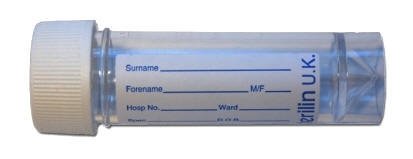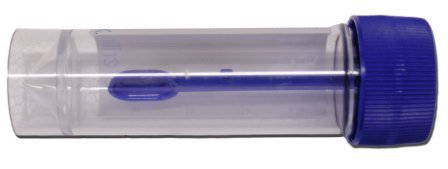Porphyrins
Chemical Pathology
Notes
The porphyrias are a group of rare inherited or acquired disorders in which a deficiency in one of the enzymes involved in porphyrin synthesis results in decreased formation of haem, and accumulation of excess porphyrins or their precursors.
Sample requirements
- The appropriate specimen type(s) required is dependent on initial clinical presentation and investigations required.
- Refer to European Porphyria Network for further information/details or contact the duty biochemist to discuss.
- Once required samples ascertained, refer to sample tube details below
- All samples must be protected from the light.
Blood
Blood taken into an 4mL EDTA tube (PROTECTED FROM LIGHT)

Urine
Early morning urine collected into 30mL Universal (PROTECTED FROM LIGHT)

Faeces
Minimum 5g faeces collected into blue top stool pot (PROTECTED FROM LIGHT)

Storage/transport
Send at ambient temperature to the laboratory on the day of collection, and protected from the light (wrap in foil or brown paper). Do not store.
Required information
Relevant clinical details including any details of family history.
Turnaround times
Samples are sent for analysis to King's College Hospital, London. Results are expected back within 3 weeks.
Reference ranges
Reference ranges are provided by the referral laboratory:
| Test Performed | Reference Range |
|---|---|
| Plasma Porphyrins | <11.2 nmol/L |
| Faecal Porphyrins | <50 nmol/g stool |
| Total Urine Porphyrins (random) | <320 nmol/L |
| Total Urine Porphyrin:creatinine ratio | <35 nmol/mmol |
| Total Urine Porphyrin (24 hour collection) | <410 nmol/24hr |
| Red Cell Free Protoporphyrin | 0-200 nmol/L cells |
| Red Cell Zinc Protoporphyrin | 0-800 nmol/L cells |
Further information
To learn more about porphyrins or porphyria visit Lab Tests Online or British Porphyria Association
See also : Drug database for Acute Porphyria
Page last updated: 05/02/2019